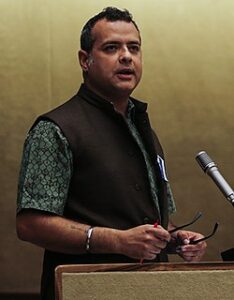
Chris Stringer – Photo: wikipedia
An interview with Professor Chris Stringer, one of the leading experts on human evolution.
There’s a paradigm shift underway in our understanding of the past 4 million years of human evolution: ours is a story that includes combinations with other Homo species, spread unevenly across today’s populations—not a neat and linear evolutionary progression.
Technological advances and a growing body of archaeological evidence have allowed experts in the study of human origins and prehistory to offer an increasingly clear, though complex, outline of the bio-historical process that produced today’s human population and cultures.
For the most part, the public is presented with new findings as interesting novelty items in the news and science coverage. The fuller picture, and the notion that this information has valuable implications for society and our political arrangements, doesn’t usually percolate into public consciousness, or in centers of influence.
But there is an emerging realization in the expert community that humanity can greatly benefit from making this material a pillar of human education—and gradually grow accustomed to an evidence-based understanding of our history, behavior, biology, and capacities. There’s every indication that a better understanding of ourselves strengthens humanity as a whole and makes connection and cooperation more possible.
The process will realistically take decades to take root, and it seems the best way at this point to accelerate that process is in articulating the big picture, and giving people key footholds and scientific reference points for understanding.
I reached out to discuss some of the bigger conclusions that are emerging from the research with Professor Chris Stringer, who has been at the forefront of human evolutionary understanding for decades. Stringer helped formulate the “Out of Africa” model of our species’ origins and continues to pursue pioneering projects at the UK Natural History Museum in London as research leader in human origins in the Department of Earth Sciences.
Jan Ritch-Frel: A good place to start is that we know that today’s humans produced fertile offspring with relative Homo species that had separated from us hundreds of thousands of years ago, and this went on with ancestor species for as far back as scientists are able to trace. This is against a backdrop that for primate species it was possible to produce fertile offspring with other species sharing a common ancestor as far back as 2 million years—with a generally decreasing chance of success across the passage of time and divergence between Homo species.
Chris Stringer: We know that our species produced some fertile offspring with Neanderthals, and with Denisovans. We also have negative evidence that there were limits on infertility between some of the Homo species because we don’t find a lot more evidence of it in our genomes (at least at the level at which we can detect it)—thus matings between more distantly related species either didn’t occur, were not fertile, or we can’t detect them at the level of our current technology.
There are barriers, and we know that in our genomes today, there are areas of deserts where there’s zero Neanderthal and Denisovan DNA. And we know that some of those deserts are in areas that influence things like speech and vocalization, and how the brain works. There are also suggestions that male children may have been less fertile or infertile compared with the female children of those hybrid matings. At the level we can detect it, there is no strong evidence so far of infertility between Homo sapiens and our more distant relatives such as Homo floresiensis or Homo naledi.
So we don’t yet know all of the Homo species which could have hybridized or did hybridize during the last 2 million years, but certainly some of them would have been interfertile. We know that we, Neanderthals, and Denisovans were interfertile, for example.
Ritch-Frel: Unpacking what you’ve said here, it changes the coordinates of how we explain human evolution to ourselves—not a linear progression, but a series of combinations, of different groups that occasionally produced advantages for survival. In some cases, survival for a migrating Homo population could be assisted by hybridizing with a resident species that had survived in a region for hundreds of thousands of years or more, picking up their adaptions—to the immune system, to the ability to process oxygen, or other traits—not to mention the informational exchange of culture and lifestyle.
The more one learns about this, the easier it is to see that the passage of time is better thought of as just an ingredient in the human evolutionary story. With this in mind, it’s easier to grasp how far astray the concept of “primitive” can take us in understanding ourselves and our evolutionary process.
As the world begins to put this information at the center of human education, it’s so important to get the root words right as best we can.
Stringer: “Archaic” and “modern,” “human” and “non-human”—they’re all loaded terms. What’s a human? And there are many different definitions of what a species is.
There are some people who only use “human” for sapiens, and then the Neanderthals even wouldn’t be human. I don’t agree with that, because it means that we mated with “non-humans” in the last 50,000 years, which I think makes the conversation very difficult.
In my view, the term “human” equates to being a member of the genus Homo. So I regard the Neanderthals, rhodesiensis, and erectus as all being human.
And the terms “modern” and “archaic”—these are difficult terms. And I’ve tried to move away from them now because on the one hand, the term “modern” is used for modern behavior, and it’s also used for modern anatomy, so these terms get confused. For example, some ancient human fossil findings have been described as “anatomically modern” but not “behaviorally modern”—I think that’s just too confusing to be useful.
When we look at the early members of a Homo species, instead of having the term “archaic,” as in having “archaic traits,” I think it’s clearer if we use the term “basal.” Basal puts us on a path without the confusion and baggage that can come with terms like “archaic,” “primitive,” and “modern.” In this usage, “basal” is a relative term, but at least one where we can come up with criteria (such as skeletal traits) to delineate it.
It helps here to consider the evolutionary process outside of Homo sapiens. Neanderthals had a process of evolution as well from the period they split off with our common ancestor. Neanderthals at the end of their time were very derived, quite different from how they started potentially 600,000 years ago, and yet under conventional thinking they are called “archaic” (compared with us “moderns”). Over the period of hundreds of thousands of years, they developed a number of new physical features that were not there in the common ancestor with Homo sapiens. For example, they developed a face that was pulled forward at the middle, a spherical cranial shape in rear view—even some of the ear bones were a different shape. And like us, they evolved a bigger brain. The derived Homo neanderthalensis looked quite different from their ancestors 300,000 years earlier.
So let’s scrap the verbal framework of “primitive” and “archaic” and “modern” and go with “basal” and “derived” along both our and the Neanderthal lineage.
Ritch-Frel: Another recent shift in understanding is the story of how we learned to walk. A growing body of research suggests it happened on tree branches and that our arms had a role to play in providing balance.
Stringer: When you look at orangutans and gibbons, who are our close living relatives over in Southeast Asia, we see that when they’re in the trees they already are walking upright, and they branch walk. Some of the tenderest leaves and fruits are out on the ends of branches, so using their longer arms, they will actually walk along the branches, supporting themselves by holding on with one or two hands to the branch above. And then they can also jump across easily from the ends of the branches to the next tree, to carry on feeding.
So the view is that this is a physique that is pre-adapted to bipedalism. Their bodies are already part-adapted to an upright posture, and the pelvis is already in a situation where they can support themselves on two legs. The working idea would be that our ancestors went through a similar stage where they were branch walking, feeding in the trees, beginning to regularly get their body into an upright position. And then when they come down between trees, the trees maybe start to thin out if areas become drier, and they stay upright as they walk between the trees until they get to the next clump of trees.
I don’t think we really have a very convincing evolutionary alternative scenario. Consider that this adaption to bipedalism takes place over millions of years. If you imagine a creature that is on all fours, what’s going to make it start walking upright and do it for long enough for the skeleton to be modified by evolution to become fully bipedal? They have to survive along the way of that process. Very difficult to imagine.
People like Darwin originally speculated that bipedalism came out of the need to use tools or carry things, and it’s certainly useful to do those things, once you are bipedal. But what’s going to modify a skeleton, modify the musculature and all of that, in the way that evolution tells us that primates evolve over the course of generations?
Ritch-Frel: Taking that point as to the origins of learning to walk, it leads into the discussion on two Homo fossil groups found in Southeast Asia, Homo floresiensis on the island of Flores, Indonesia, and luzonensis in Callao Cave on the island of Luzon in the Philippines—and floresiensis with an adult height at somewhere only a bit over a meter tall.
Floresiensis caught the attention of the world public back in 2003. We were presented with the discovery of a “primitive creature,” one that more often gets called an “it” than a person. The more curious members of the public who dig deeper into this discovery are usually told that these “hobbits” were a product of evolutionary dwarfism, often found on islands, where larger creatures are reduced in size from resource constraints and smaller gene pools. Always present in discussions about floresiensis is a focus on their small “primitive” brains. We’re beginning to learn that size may not matter as much as the layout of the brain when we compare ourselves to our ancestors and their core capacities. (I’ll ask you more about this later on.)
More recently, in 2019, archaeologists announced a fossil discovery found almost 2,000 miles away in the Philippines currently given a species name Homo luzonensis that has a lot of similarities to floresiensis.
Until their discovery, it was thought that the first hominins/humans to arrive in Southeast Asia were Homo erectus, who is known to have left Africa about 2 million years ago.
It’s notable that some experts argue floresiensis was able to walk, but not run. And that floresiensis’s humerus, the upper arm bone, was longer than its femur, the upper leg bone. This is typical of a body type adapted for climbing. The wrist bones also point to climbing. That kind of evolutionary branch, I understand, goes back closer to somewhere beyond 2.5-3 million years ago, and would force a rethinking about which Homo species locomotion style first left Africa and possibly set the stage to influence and hybridize with African relatives who came after.
Floresiensis/luzonensis is an area where there is no consensus among the experts—and the public might find the schools of thought illustrative about the frontiers of our understanding about the human evolutionary story.
Stringer: Some experts argue that the most convincing scenario is that the floresiensis material is derived from Homo erectus—that this is a dwarf form of Homo erectus that somehow got to Flores, underwent dwarfing, and… retained some erectus characteristics. We know erectus left Africa approximately 2 million years ago. Some of the dental features of floresiensis have been suggested to be clear evidence of an erectus ancestry. For this idea to work, floresiensis would have needed to have an ancestor who independently developed or redeveloped basal features—features which look more like ancestral features of previously developed species in Africa. As you’ve mentioned, the body proportions, the upper body that seems to show adaptations for climbing. Perhaps floresiensis may have gone back into the trees for feeding. That’s a possibility.
This dwarfing process would have had to occur subsequently in the island migration process in Southeast Asia. That is a scenario which some people who know their Homo erectus fossils will argue is there. That’s one school of opinion on floresiensis.
And on the other hand, you have some experts working along the lines you’ve alluded to, that actually this is evidence of a pre-erectus exit from Africa. A Homo habilis or even an australopithecine grade came out of Africa, somehow got all the way over to Southeast Asia, in terms of fossils we know about, and maybe on Luzon in the Philippines as well for Homo luzonensis. In favor of that, we’ve got these basal features in the wrist bones and in the pelvis and the shoulders, and the smaller brain.
That’s a pretty convincing scenario. But if you agree with that, then you’ve got to conclude that some convergent, or independently similar, evolution in their teeth toward Homo erectus had to happen. Aspects of the skull look erectus-like. Floresiensis has a small face that’s tucked under the cranial vault, which required some derivation. Floresiensis would have had to have both independent similar evolution to erectus, and a return to some more basal elements of their ancestors.
There is a compromise view, that floresiensis is the product of a basal erectus. Some of the erectus skeleton fossils found at a site called Dmanisi in the country of Georgia, they’re much smaller-brained. One of the fossils has a brain size not too different from floresiensis.
We could be starting from an erectus that’s smaller-bodied, smaller-brained, and maybe then it could have gotten across to Flores eventually, and evolved and survived there for more than a million years. We have to bear in mind that we actually don’t know the full anatomy of erectus anyway. So what were the wrist bones like in Dmanisi? Were they like those found in Flores? We simply don’t know yet, because they’re not preserved so far.
In any of these cases you’ve also got the mystery of how they even got to Flores—there are no land bridges there that appear when sea levels drop during ice age periods. The people who argue floresiensis was more closely related to humans via the erectus line suggest there was a capability of maybe using watercraft to get to Flores.
But the other option is that its arrival on Flores was accidental. Tectonically this part of Indonesia is one of the most active areas in the world, caused by volcanic eruptions and earthquakes. There was a major tsunami in the Indian Ocean in 2004. People were found out at sea days later, surviving on clumps of vegetation. That was something that happened in the last 20 years. When you’ve got a time scale of thousands, hundreds of thousands, millions of years potentially, these “rare” events can happen. We know that’s how many other animals must have gotten across to these islands between Java and Papua New Guinea/Australia.
It’s possible that some ancestors of floresiensis were maybe foraging in mangrove swamps on the coast, and a tidal wave ripped a whole area away, and they’re left in there, and somehow miraculously a few weeks later they arrive on Flores or on another island, because it could have been accomplished in stages. It doesn’t have to be straight all the way to Flores.
Ritch-Frel: Whether floresiensis rafted by design or accident, there is this other piece of evidence that we identify with human advancement—stone toolmaking. Archaeologists found at two sites on the island of Flores tools associated with butchering meat that are 700,000 and even over a million years old.
With floresiensis, we have a body that was perhaps unable to run, able to walk, but better suited for climbing. We have a brain described as tiny, yet able to make tools. Turning to the 2013 discovery of Homo naledi in South Africa, we have 230,000-to-300,000-year-old evidence of another Homo species that had curvature on the finger bones that is associated with primates who spend their time climbing, and also a hand bone structure that allows people to bring complexity in their toolmaking. It has a foot structure similar to ours. Like floresiensis, naledi also has a brain much smaller than ours, but also like floresiensis, it has a similar brain structure. Tools have been found in the area that the archaeologists believe may have been created by naledi.
The archaeological team that is working on the naledi site tells us there is evidence of a culture with traits that we and our cousin species would recognize—returning to the same cave to deposit their dead, and using fire to navigate it. Neanderthals left a record of depositing dozens of their dead in a cave in Spain called Sima de los Huesos about 430,000 years ago. Whether what we are looking at in these caves are cases of mass murder or ritual or something else, we just don’t have the evidence to say. In Bruniquel cave in France, we have evidence of Neanderthal use of fire and potentially habitation in the cave at least 175,000 years ago.
Remembering the dead, of course, is not unique to us. Elephants visit and mourn the remains of their relatives and herd members throughout the decomposition process. Chimpanzee mothers will carry their dead infants with them for days.
Stringer: Naledi is very intriguing. We can explain the survival of floresiensis long term and its divergent evolution in isolation, and Homo sapiens doesn’t get there until maybe the last 50,000 years, and then floresiensis disappears. But in the case of naledi, we’ve got it in South Africa, on a continent where we’re pretty sure Homo sapiens had already evolved, where other Homo species, such as rhodesiensis, were present. And yet naledi is surviving in South Africa with an ape-sized brain successfully, seemingly, and may be spending its time deep in the cave systems there.
I have been one of the critics of the intentional burial disposal idea, because I’ve argued that “How complex could the behavior be of a creature with a brain the size of a chimpanzee or a gorilla?”
But I’m more than happy to be surprised by much greater complexity in Homo naledi when peer-reviewed research makes the case for it (which may be soon).
Ritch-Frel: There’s a big emphasis on the size of the brains of our relatives in the public and expert conversation on human origins, for comparing ourselves to our ancestors and cousins. In the case of floresiensis and naledi, the public conversation keeps returning to how small their brains are. Naledi had a brain size of 600 milliliters; each of us has around 1,300. Could that be a bit of a red herring in terms of their core capacities? Should we be putting more emphasis on the layout of the core brain structures? Does that deserve to get some more emphasis in comparison to us?
Stringer: The whole question of brain size and complexity of behavior, it’s been a long-running debate.
Neanderthals and sapiens have relatively big brains in the Homo family. You can see a rough correlation between increasing behavioral complexity in stone tools and the size of the brain. It’s a rough correlation, not a one-to-one. That’s why I think naledi is going to be very important, because if the research team demonstrates complexity of behavior I think it will certainly put a nail in the coffin of the idea that a small hominin brain can’t accomplish complex things.
Ritch-Frel: Given that, and going back to some of the tree-dwelling morphologies retained, is it fair to wonder now whether the intelligence that humans tend to prize about themselves and use as a marker of our difference from other animals was developed up in trees rather than exclusively on the ground? We know that young chimpanzee females make dolls, for example, with which they simulate child-rearing.
Stringer: I think even looking at chimps and gorillas, they have clear intelligence greater than most other creatures, most other mammals. Certainly it was there in the common ancestor. So I think the common ancestor of us and chimps about 7 million years ago already had complex behavior and potentially even toolmaking behavior at that early stage.
Why not? So I think yes, it could have started to develop in the trees. And as I say, orangutans are intelligent too. So I think the common ancestor would’ve had that degree of intelligence. But there are arguments that by the time we get to Australopithecus, there has been some restructuring of the brain, which implies maybe a reorganization for more complex thought.
Ritch-Frel: We now know that there are at least as many as five distinct human species that were living on Earth as recently as 70,000 years ago: Homo sapiens, neanderthalensis, denisova, floresiensis, and luzonensis. And we can demonstrate through several lines of evidence that they not only had different anatomy, but that they also had varying physical capacities, and behavioral traits or tendencies.
A 1-meter-tall human species in Indonesia had a foot that made running difficult. Research tells us that Neanderthals tended to be aggressive, be morning people, have depression; that they would have struck us as dogmatic, and that they had repetitive behaviors.
On top of this, we also know that sapiens across the planet today carry genomic material from hybridizing with at least six Homo species, some of whom we think went extinct as an independent, separate species long before 70,000 years ago. Two of these species we can name, Neanderthal and Denisovan, and the other four science hasn’t named yet—but we have genomic evidence for these “mystery ancestors.”
It’s not yet part of the public conversation, but can you see a future where people might identify themselves and their behaviors as typical of their family, religion, regional origins, and also of their inheritances from ancestor species in an environment where understanding ourselves strengthens the bonds of cooperation and provides us with a universalizing framework of relatability?
Stringer: There’s definitely evidence of sapiens interbreeding with Neanderthals, and that is still thought to be one fairly closely related group of Neanderthals that hybridized with Homo sapiens. But for Denisovans, it’s at least three different population groups of Denisovans who diversified approximately 300,000 years ago that interbred with Homo sapiens in different parts of Asia and Southeast Asia.
And back to your question about identity. Yes, I think that we know from studies of what the Neanderthal DNA is doing in us today that bits of Neanderthal DNA are related, for example, to whether you’re a morning or an evening person. We know that some bits of Neanderthal DNA have given protection against COVID. The age of menopause and the start of menstruation. Addictive behavior appears to be related in some cases to bits of Neanderthal DNA.
There are suggestions that autism, schizophrenia, certainly autoimmune diseases, they also are influenced to an extent by the presence of Neanderthal DNA, and probably we will find similar things for Denisovan DNA. So it’s certainly affecting us, our core biology, our personalities.
And for Denisovans, in some populations there’s double the amount of Denisovan DNA than Neanderthal DNA. Populations in Southeast Asia have Neanderthal DNA at the same level as, say, Europeans or Asians, but they’ve got an additional maybe 4 percent of Denisovan DNA. So theoretically we imagine that’s going to have an even greater effect. We know it affects the immune systems, but it may have other effects as well.
Author Bio:
Jan Ritch-Frel is the executive director of the Independent Media Institute
Source: Independent Media Institute
Credit Line: This article was produced by Human Bridges, a project of the Independent Media Institute.





